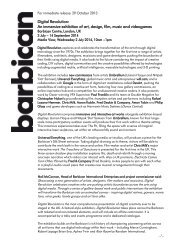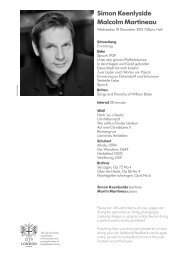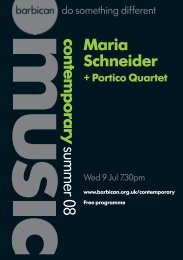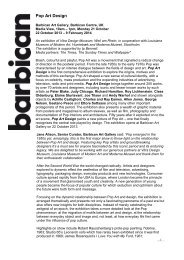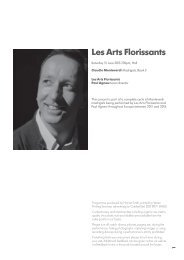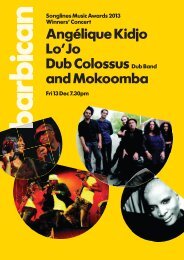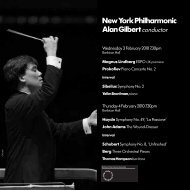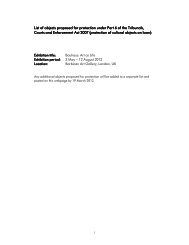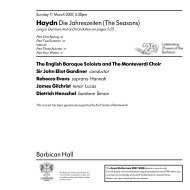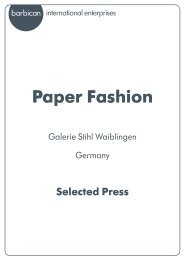You also want an ePaper? Increase the reach of your titles
YUMPU automatically turns print PDFs into web optimized ePapers that Google loves.
1<br />
<strong>Barbican</strong> <strong>Britten</strong>:<br />
<strong>The</strong> <strong>Sixteen</strong><br />
Friday <strong>22</strong> <strong>Nov</strong>ember 2013 7.30pm, Union Chapel<br />
Benjamin <strong>Britten</strong><br />
Hymn to the Virgin<br />
A Shepherd’s Carol<br />
New Year Carol<br />
Hymn to St Cecilia<br />
Five Flower Songs – Nos 1 & 2<br />
Gloriana Dances<br />
interval 20 minutes<br />
Five Flower Songs – Nos 3 & 4<br />
<strong>The</strong> Ballad of Little Musgrave and Lady Barnard<br />
Five Flower Songs – No 5<br />
Sacred and Profane<br />
<strong>The</strong> <strong>Sixteen</strong><br />
Harry Christophers conductor<br />
Frances Kelly harp<br />
Christopher Glynn piano<br />
<strong>The</strong> first four pieces are intended to be<br />
performed as a group. Please reserve your<br />
applause until after Hymn to St Cecilia.<br />
Programme produced by Harriet Smith; printed by Mandatum<br />
Ink; advertising by Cabbell (tel. 020 8971 8450)<br />
Confectionery and merchandise including organic<br />
ice cream, quality chocolate, nuts and nibbles are<br />
available from the sales points in our foyers.<br />
Please turn off watch alarms, phones, pagers etc during the<br />
performance. Taking photographs, capturing images or using<br />
recording devices during a performance is strictly prohibited.<br />
If anything limits your enjoyment please let us know<br />
during your visit. Additional feedback can be given<br />
online, as well as via feedback forms or the pods
<strong>Barbican</strong><br />
<strong>Britten</strong><br />
Celebrating <strong>Britten</strong>’s centenary through music, dance, films and talks<br />
6–24 <strong>Nov</strong><br />
6, 7 & 9 <strong>Nov</strong>, <strong>The</strong>atre<br />
Richard Alston Dance Company/<br />
<strong>Britten</strong> Sinfonia<br />
Dance works, including two world premieres<br />
to music by <strong>Britten</strong>.<br />
Fri 8 <strong>Nov</strong>, Hall<br />
Our Hunting Fathers/<br />
Ian Bostridge<br />
<strong>Britten</strong>’s brilliantly daring songcycle<br />
with <strong>Britten</strong> Sinfonia.<br />
8–10 <strong>Nov</strong><br />
Illuminating <strong>Britten</strong><br />
A three day celebration exploring <strong>Britten</strong>’s<br />
life and music through film screenings, talks,<br />
panel discussions and performances.<br />
Sun 10 <strong>Nov</strong>, Royal Albert Hall<br />
War Requiem<br />
<strong>Britten</strong>’s epic masterpiece performed<br />
by the BBC Symphony Orchestra.<br />
Sun 10 <strong>Nov</strong>, Milton Court <strong>The</strong>atre<br />
Journeying Boys<br />
Iain Burnside and the Guildhall School<br />
explore the personalities of Benjamin<br />
<strong>Britten</strong> and poet Arthur Rimbaud.<br />
15 & 16 <strong>Nov</strong>,<br />
St Giles Cripplegate<br />
Curlew River Echo (free)<br />
An audio-visual installation inviting you<br />
to experience the opera in a mysterious<br />
and thought-provoking way.<br />
Fri <strong>22</strong> <strong>Nov</strong>, Union Chapel<br />
<strong>The</strong> <strong>Sixteen</strong><br />
A concert featuring a selection of<br />
<strong>Britten</strong>’s most popular choral music.<br />
Sat 23 <strong>Nov</strong>, Hall<br />
Albert Herring<br />
<strong>Britten</strong>’s witty comic opera performed<br />
by the BBC Symphony Orchestra.<br />
Sun 24 <strong>Nov</strong>, Milton Court<br />
Serenade for Tenor,<br />
Horn and Strings<br />
<strong>Britten</strong> Sinfonia and Mark Padmore<br />
perform <strong>Britten</strong>’s evocative song cycle.<br />
barbican.org.uk<br />
14–16 <strong>Nov</strong>,<br />
St Giles Cripplegate<br />
Curlew River<br />
A new multimedia staging of <strong>Britten</strong>’s<br />
haunting church parable.<br />
2<br />
Where will the<br />
music take you?
Welcome to <strong>Barbican</strong> <strong>Britten</strong><br />
At the climax of Benjamin <strong>Britten</strong>’s centenary<br />
year, this is a wide-ranging, thought-provoking<br />
examination of a composer who is central to the<br />
music of our time. Some composers’ reputations<br />
fade for a while after their death; <strong>Britten</strong>’s, on<br />
the contrary, has grown and grown. Alongside<br />
regular performances of his masterpieces and<br />
the international success of his operas, his work<br />
is now stimulating an increasing range of new<br />
responses from creative artists and performers.<br />
Over these two weeks we highlight bold new<br />
directions in <strong>Britten</strong> interpretation, and we are<br />
delighted to present Richard Alston Dance<br />
Company’s radical interpretations of <strong>Britten</strong>’s<br />
vocal works, Les illuminations, Phaedra and<br />
Sechs Hölderlin Fragmente, Netia Jones’s<br />
innovative staging of the church parable<br />
Curlew River with tenor Ian Bostridge; and<br />
concerts with <strong>Britten</strong> Sinfonia, <strong>The</strong> <strong>Sixteen</strong><br />
and the BBC Symphony Orchestra (who<br />
take us to the Royal Albert Hall for the War<br />
Requiem, and back here for Albert Herring).<br />
At the heart of the season is the Illuminating<br />
<strong>Britten</strong> weekend – an unmissable three days<br />
<strong>Barbican</strong> Classical Music Podcasts<br />
For more information about <strong>Barbican</strong> <strong>Britten</strong>, and to listen<br />
to our other <strong>Barbican</strong> <strong>Britten</strong> podcasts, visit www.barbican.<br />
org.uk/britten.<br />
Available on iTunes, Soundcloud and the <strong>Barbican</strong> website<br />
curated by <strong>Britten</strong> expert John Bridcut and<br />
generously supported by the <strong>Britten</strong>–Pears<br />
Foundation. Discussions, presentations, films,<br />
readings and music, with a wide range of<br />
speakers debating some of the controversial<br />
issues in <strong>Britten</strong>’s life and legacy, will allow us to<br />
see <strong>Britten</strong> anew and deepen our understanding<br />
of his work. A new drama by Iain Burnside,<br />
Journeying Boys, completes the weekend.<br />
This season demonstrates so much of what<br />
we want the <strong>Barbican</strong> to be: providing worldclass<br />
arts and learning for all, working closely<br />
with our artistic partners and the Guildhall<br />
School of Music & Drama. We are using the<br />
full range of superb venues that now surround<br />
us in this outstanding cultural area – from<br />
the Guildhall School’s new Milton Court to<br />
the <strong>Barbican</strong> Hall, <strong>The</strong>atre and cinemas,<br />
and the Church of St Giles Cripplegate – to<br />
produce a unique celebration of a genius.<br />
Enjoy the rich variety of <strong>Barbican</strong> <strong>Britten</strong>!<br />
Sir Nicholas Kenyon<br />
Managing Director, <strong>Barbican</strong> Centre<br />
3 Introduction
Benjamin <strong>Britten</strong> at 100<br />
Benjamin <strong>Britten</strong> was born on <strong>22</strong> <strong>Nov</strong>ember<br />
– feast day of St Cecilia, patron saint of music<br />
– making it hard not to see his career as fated,<br />
somehow meant to be. It’s a sensation that<br />
only grows when you think of the precocious<br />
young <strong>Britten</strong> producing his first ‘compositions’<br />
at just 5 years old in a house that didn’t<br />
even contain a gramophone, displaying an<br />
instinctive talent only partially explained by the<br />
enthusiasm of his amateur-musician mother.<br />
Tonight’s concert marks <strong>Britten</strong>’s 100th birthday<br />
with a programme of the composer’s works<br />
for choir. Although he is arguably best-known<br />
for his operas, it is in the choral writing that we<br />
find the real musical constant, the touchstone,<br />
of his career. Spanning 45 years, tonight’s<br />
programme is bookended by the Hymn to the<br />
Virgin (written when <strong>Britten</strong> was just 16) and<br />
Sacred and Profane (dating from the year<br />
before his death), tracing the development<br />
of a composer from his earliest explorations<br />
to musical maturity and sophistication.<br />
Confined to his boarding-school sanatorium by<br />
illness, the teenage <strong>Britten</strong> wrote the carol that<br />
would become one of his best-loved pieces –<br />
the exquisite Hymn to the Virgin. It carries great<br />
significance on slight musical shoulders – having<br />
gained the composer entry to the Royal College<br />
of Music – and would eventually be one of only<br />
two pieces performed at his own funeral. It was<br />
also the first of four such hymns that <strong>Britten</strong> would<br />
produce, each dedicated to a different saint.<br />
<strong>The</strong> Hymn to the Virgin is a perfect miniature,<br />
setting an anonymous medieval text with a<br />
delicacy occasionally overshadowed in <strong>Britten</strong>’s<br />
later works by complexity. <strong>The</strong> composer<br />
divides his eight voices into two SATB choirs.<br />
While one remains grounded in the earthly<br />
by its English text, and in the human by its<br />
emotional crescendos and climaxes, the other<br />
is set at a distance. Singing only in Latin, these<br />
other-worldly voices echo and transmute the<br />
utterances of the first choir into music that’s<br />
unchanging, eternal. In <strong>Britten</strong>’s hands a<br />
simple, strophic hymn is itself transfigured.<br />
If the skill of the Hymn to the Virgin lies in its<br />
restraint, then the Hymn to St Cecilia is entirely<br />
the opposite. Emerging from the same flurry<br />
of creativity as A Ceremony of Carols (and<br />
at least partially composed on the same sea<br />
voyage home from America in 1942), the<br />
work is the product of a new optimism, a reembracing<br />
of national identity and professional<br />
purpose that characterised <strong>Britten</strong>’s return<br />
from self-imposed exile. Publicly attacked for<br />
the pacifist convictions that drove him from<br />
England during the war, <strong>Britten</strong> now faced<br />
up to his critics, setting English texts again<br />
in that most English of genres, the choral<br />
anthem, for the first time since his departure.<br />
And which poet could he choose but<br />
W H Auden? Auden’s verse had already<br />
proved a match and spur to <strong>Britten</strong>’s musical<br />
skill, and would here drive him even further. An<br />
ode in praise of the patron saint of music, the<br />
poem is divided into three sections which form<br />
three short movements for unaccompanied<br />
SSATB choir. <strong>The</strong> first takes its cue from Purcell,<br />
constructing the flowing, modal lines of the<br />
sopranos and altos over a sort of ground bass<br />
in the lower voices. <strong>The</strong> refrain, a variation of<br />
which divides each movement, derives from<br />
the music of this opening. <strong>The</strong> central section,<br />
‘I cannot grow’, is a breathless scherzo, the<br />
scalic innocence and simplicity of its melody<br />
4
contradicted by complex fugal counterpoint. <strong>The</strong><br />
final movement is extended and lyrical, pushing<br />
beyond the seeming restrictions of another<br />
opening ostinato and giving way to instinctive,<br />
joyous solos and a final choral flourish.<br />
Auden’s professional influence on <strong>Britten</strong> was as<br />
brief as it was intense, but provoked some of the<br />
composer’s most creative musical responses. A<br />
Shepherd’s Carol (1944) is another example – an<br />
extraordinary, inscrutable piece, and one of the<br />
only remaining clues to a major work that might<br />
have been. While based in America during<br />
the war, Auden started work on the text of his<br />
Christmas Oratorio, intending that <strong>Britten</strong> should<br />
set it. In the end though, only two extracts made<br />
it into music, including this Shepherd’s Carol.<br />
Advised by Auden that it should be treated<br />
either as ‘jazz or folk-song’, <strong>Britten</strong> chose the<br />
latter. A traditional structure of solo verses and<br />
refrain however becomes something rather<br />
unexpected. <strong>The</strong> music of each unaccompanied<br />
verse finds a different melodic way to arrive<br />
back at the chorus, reframing and casting doubt<br />
on its sugary certainty (the affectation of ‘O lift<br />
your little pinkie’ is echoed in <strong>Britten</strong>’s cloying,<br />
quasi-folk harmonies and smug Lombardic<br />
rhythms). Auden’s poetry is associative and<br />
bizarre, provoking contrasting responses from<br />
each of the four soloists that range from codopera<br />
(tenor) to a forthright, popular-style song<br />
from the alto. Withdrawing the piece after<br />
its first performance, perhaps <strong>Britten</strong> himself<br />
felt uneasy over his strange stylistic collage,<br />
that nevertheless offers a characteristically<br />
original take on the Christmas carol.<br />
Treble voices have a particular significance for<br />
a composer who always wished himself back at<br />
the age of 13. Innocence remains tantalisingly out<br />
of reach in the operas – corrupted in <strong>The</strong> Turn<br />
of the Screw, untouchable in Death in Venice,<br />
tragically betrayed in Billy Budd – but enjoys a<br />
much less complicated relationship with <strong>Britten</strong>’s<br />
choral writing. Friday Afternoons (from which<br />
A New Year Carol comes) is a cycle of unison<br />
songs for upper voices originally composed for<br />
<strong>Britten</strong>’s schoolmaster brother and his school<br />
choir. Although nothing could be simpler than the<br />
melodies, <strong>Britten</strong> manages to insert his distinctive<br />
musical voice into piano accompaniments that<br />
subvert as often as they support. Here, in a<br />
carol based on the pagan New Year custom for<br />
children to sprinkle passers-by with water from a<br />
well, <strong>Britten</strong> sets the lilting melodic explorations<br />
of his voices against anchoring chords in piano<br />
(or harp), giving the whole a folk-innocence and<br />
a true simplicity that couldn’t be further from<br />
the muted cynicism of the Shepherd’s Carol.<br />
<strong>The</strong> Choral Dances from <strong>Britten</strong>’s Elizabeth I<br />
opera Gloriana were adapted by the composer<br />
himself from a sequence in Act 2 in which the<br />
townsfolk of Norwich present a masque for<br />
the visiting queen. <strong>The</strong> six Dances (scored for<br />
choir, harp and a solo tenor who serves as<br />
master of ceremonies) are poised somewhere<br />
between satire and sincerity, pastiche and<br />
pomp. <strong>The</strong>y capture both the performers’<br />
rustic attempts at sophistication (the use purely<br />
of consonant intervals in the Second Dance,<br />
depicting ‘Concord’, feels comically literal) and<br />
their energetic charm (the lively syncopation<br />
of the Fifth Dance or the forthright bell-chime<br />
patterning of the First Dance). <strong>The</strong> set concludes,<br />
however, with a movement that transcends goodhumoured<br />
mockery to deliver a radiant prayer<br />
of praise. No-one imbues C major with more<br />
warmth than <strong>Britten</strong>, and as the canonic waves<br />
of entries ripple over one another in endless<br />
cycles, we find ourselves no longer in England<br />
but suddenly in the Albion of poets’ imagination.<br />
Composed as a silver wedding present for<br />
Leonard and Dorothy Elmhirst (friends and –<br />
crucially – benefactors of <strong>Britten</strong>’s), the Five<br />
Flower Songs are among the most conservative<br />
of all the composer’s choral cycles. That isn’t to<br />
say they lack interest or invention, simply that<br />
the iconoclasm of A Boy Was Born or Christ’s<br />
Nativity has no place here. While many of<br />
<strong>Britten</strong>’s earlier choral works look determinedly<br />
to a musical future, this set from 1950 feels like a<br />
gentle homage to an earlier age, to the pastoral<br />
cycles of Stanford and Parry. It’s an effect only<br />
heightened by the choice of poets – Herrick,<br />
Crabbe, Clare and an anonymous balladeer.<br />
We start briskly, with any undue sentimentality<br />
over Herrick’s fading daffodils dulled by <strong>Britten</strong>’s<br />
matter-of-fact treatment – voices dancing<br />
together in imitative counterpoint that feels<br />
anything but mournful. But both Herrick’s ‘<strong>The</strong><br />
Succession of the Four Sweet Months’ and John<br />
Clare’s ‘<strong>The</strong> Evening Primrose’ indulge their<br />
5 Programme notes
texts rather more, with the latter poised right<br />
on the edge of Victoriana, even as ‘dewdrops<br />
pearl the evening’s breast’. This is as close as<br />
<strong>Britten</strong> ever gets to Elgar: not quite pastiche<br />
perhaps, but certainly an affectionate echo.<br />
<strong>Britten</strong>’s mastery, however, lies in his<br />
juxtapositions. <strong>The</strong> ‘slimy root’ of Crabbe’s<br />
‘Marsh Flowers’ quickly reasserts nature’s<br />
muddier, uglier aspect, while anyone lingering<br />
over the tranquil beauty of Clare’s primrose<br />
finds themselves pulled up briskly by the<br />
impetuous energy of the ‘Ballad of Green<br />
Broom’, its witty, quasi-instrumental effects<br />
(recalling the Hymn to St Cecilia) imitating<br />
the limited range of a novice guitar or lute<br />
player. It’s a sophisticated joke to end a cycle<br />
of rare sincerity and sweetness from <strong>Britten</strong>.<br />
Composed in 1943, <strong>The</strong> Ballad of Little Musgrave<br />
and Lady Barnard is a concise masterpiece.<br />
<strong>Britten</strong> takes an anonymous ballad and morphs<br />
it into a sophisticated exercise in musical<br />
narrative. Set for the unusual ensemble of men’s<br />
voices and piano, the work was composed<br />
for officers in a German concentration<br />
camp, where it was performed during their<br />
incarceration. It’s a heady tale of lust, murder<br />
and revenge, in which Lord Barnard kills his<br />
wife and her lover. Each stage of the story<br />
is minutely wrought, from the tolling church<br />
bells of the opening (heard in the piano) that<br />
transform into the hooves of Barnard’s horse,<br />
to the duel between the two men, and finally<br />
the mourning song of the grieving husband.<br />
Coherence and continuity – of theme, music or<br />
treatment – may have characterised <strong>Britten</strong>’s<br />
earlier cycles, but Sacred and Profane is more<br />
interested in contrast and oppositions. <strong>The</strong><br />
conflict of the work’s title permeates this riotous,<br />
virtuosic work that celebrates the cultural<br />
collisions of medieval England. It’s as though<br />
the two choirs of the Hymn to the Virgin have<br />
come together as one, lurching artfully from<br />
the spiritual to the emphatically secular.<br />
It’s curious that so energetic a work (both in<br />
its vocal demands and the complexity of its<br />
invention) should have emerged so late in<br />
<strong>Britten</strong>’s career. By 1975 the composer was<br />
ill; heart surgery had prolonged his life but<br />
had also weakened him. Yet the same late<br />
surge that produced Death in Venice and the<br />
cantata Phaedra also yielded this choral cycle,<br />
composed for the five unaccompanied SSATB<br />
voices of Peter Pears’s Wilbye Consort. Writing<br />
for soloists rather than massed choral forces,<br />
<strong>Britten</strong> allows himself unusual freedom and<br />
range in constructing his vocal lines, and the<br />
effect is striking for its freewheeling athleticism.<br />
We open in pious mood; ‘St Godric’s Hymn’<br />
has the stark, declamatory intensity of a Poulenc<br />
motet, but soon regains its <strong>Britten</strong>ish flavour as<br />
harmonies thicken and meander. Before the<br />
prayer has a chance to rise up to heaven the<br />
animal cries and wails of ‘I mon waxe wod’<br />
break in – as vivid a musical evocation of<br />
madness as ever composed. <strong>The</strong> spiritual and<br />
secular collide directly in the vivid imagery of<br />
‘Lenten is come’, delighting in the wriggling,<br />
teeming signs of spring life, that are soon<br />
subdued by darkness in ‘<strong>The</strong> long night’. Sober<br />
meditation on Christ’s crucifixion (‘Yif ic of<br />
luve can’) is likewise interrupted by the pulsing<br />
babble of the ‘Carol’, just as Christ’s invitation<br />
to behold his death on the cross (‘Ye that pasen<br />
by’) has the rug pulled quickly from under it<br />
by the meticulous catalogue of human frailties<br />
of ‘A death’. Here, an old woman laboriously<br />
describes her bodily disintegration, facing<br />
death with a final insouciant bit of defiance:<br />
‘For the whole world I don’t care a jot!’ It’s a<br />
brave and heroic final stand from a composer<br />
whose own health was nearly exhausted,<br />
and who would be dead within a year.<br />
Programme note © Alexandra Coghlan<br />
6
Texts<br />
Hymn to the Virgin<br />
Alexandra Kidgell soprano<br />
Kim Porter alto<br />
Mark Dobell tenor<br />
Eamonn Dougan bass<br />
Of one that is so fair and bright,<br />
Velut maris stella,<br />
Brighter than the day is light,<br />
Parens et puella:<br />
I cry to thee, thou see to me,<br />
Lady, pray thy Son for me,<br />
Tam pia,<br />
That I may come to thee,<br />
Maria!<br />
All this world was forlorn<br />
Eva peccatrice,<br />
Till our Lord was yborn.<br />
De te genetrice.<br />
With ‘ave’ it went away<br />
Darkest night, and comes the day<br />
Salutis;<br />
<strong>The</strong> well springeth out of thee.<br />
Virtutis.<br />
Lady flow’r of ev’rything<br />
Rosa sine spina<br />
thou bare Jesu, Heaven’s King<br />
Gratia divina:<br />
Of all thou bear’st the prize,<br />
Lady, Queen of paradise,<br />
Electa:<br />
Maid mild, mother<br />
Es effecta.<br />
Anon.<br />
A Shepherd’s Carol<br />
Alexandra Kidgell soprano<br />
Kim Porter alto<br />
Mark Dobell tenor<br />
Eamonn Dougan bass<br />
O lift your little pinkie, and touch the winter sky.<br />
Love’s all over the mountains where the beautiful<br />
go to die.<br />
If Time were the wicked sheriff in a horse opera,<br />
I’d pay for riding lessons and take his gun away.<br />
O lift, etc.<br />
If I were a Valentino, and Fortune were abroad,<br />
I’d hypnotise that iceberg till she kissed me of her<br />
own accord. O lift, etc.<br />
If I’d stacked up the velvet and my crooked rib<br />
were dead,<br />
I’d be breeding white canaries and eating<br />
crackers in bed. O lift, etc.<br />
But my cuffs are soiled and fraying. <strong>The</strong> kitchen<br />
clock is slow,<br />
and over the Blue Waters the grass grew long<br />
ago. O lift, etc.<br />
W H Auden (1907–73)<br />
A New Year Carol<br />
Here we bring new water from the well so clear<br />
For to worship God with, this happy New Year.<br />
Sing levy dew, sing levy dew, the water and the<br />
wine;<br />
<strong>The</strong> seven bright gold wires and the bugles that<br />
do shine.<br />
Sing reign of Fair Maid, with gold upon her toe,<br />
Open you the West Door, and turn the Old Year<br />
go.<br />
Sing levy dew, sing levy dew, etc.<br />
Sing reign of Fair Maid, with gold upon her chin,<br />
Open you the East Door, and let the New Year in.<br />
Sing levy dew, sing levy dew, etc.<br />
Anon.<br />
7 Texts
Hymn to St Cecilia<br />
Julie Cooper, Kirsty Hopkins soprano<br />
Kim Porter alto<br />
Mark Dobell tenor<br />
Ben Davies bass<br />
I<br />
In a garden shady this holy lady<br />
With reverent cadence and subtle psalm,<br />
Like a black swan as death came on<br />
Poured forth her song in perfect calm:<br />
And by ocean’s margin this innocent virgin<br />
Constructed an organ to enlarge her prayer,<br />
And notes tremendous from her great engine<br />
Thundered out on the Roman air.<br />
Blonde Aphrodite rose up excited,<br />
Moved to delight by the melody,<br />
White as an orchid she rode quite naked<br />
In an oyster shell on top of the sea;<br />
At sounds so entrancing the angels dancing<br />
Came out of their trance into time again,<br />
And around the wicked in Hell’s abysses<br />
<strong>The</strong> huge flame flickered and eased their pain.<br />
Blessed Cecilia, appear in visions<br />
To all musicians, appear and inspire:<br />
Translated Daughter, come down and startle<br />
Composing mortals with immortal fire.<br />
II<br />
I cannot grow;<br />
I have no shadow<br />
To run away from,<br />
I only play.<br />
I cannot err;<br />
<strong>The</strong>re is no creature<br />
Whom I belong to,<br />
Whom I could wrong.<br />
I am defeat<br />
When it knows it<br />
Can now do nothing<br />
By suffering.<br />
All you lived through,<br />
Dancing because you<br />
No longer need it<br />
For any deed.<br />
I shall never be<br />
Different. Love me.<br />
Blessed Cecilia, appear in visions<br />
To all musicians, appear and inspire:<br />
Translated Daughter, come down and startle<br />
Composing mortals with immortal fire.<br />
III<br />
O ear whose creatures cannot wish to fall,<br />
O calm of spaces unafraid of weight,<br />
Where Sorrow is herself, forgetting all<br />
<strong>The</strong> gaucheness of her adolescent state,<br />
Where hope within the altogether strange<br />
From every outworn image is released,<br />
And Dread born whole and normal like a beast<br />
Into a world of truths that never change:<br />
Restore our fallen day; O re-arrange.<br />
O dear white children casual as birds,<br />
Playing among the ruined languages,<br />
So small beside their large confusing words,<br />
So gay against the greater silences<br />
Of dreadful things you did: O hang the head,<br />
Impetuous child with the tremendous brain,<br />
O weep, child, weep, O weep away the stain,<br />
Lost innocence who wished your lover dead,<br />
Weep for the lives your wishes never led.<br />
O cry created as the bow of sin<br />
Is drawn across our trembling violin.<br />
O weep, child, weep, O weep away the stain.<br />
O law drummed out by hearts against the still<br />
Long winter of our intellectual will.<br />
That what has been may never be again.<br />
O flute that throbs with the thanksgiving breath<br />
Of convalescents on the shores of death.<br />
O bless the freedom that you never chose.<br />
O trumpets that unguarded children blow<br />
About the fortress of their inner foe.<br />
O wear your tribulation like a rose.<br />
Blessed Cecilia, appear in visions<br />
To all musicians, appear and inspire:<br />
Translated Daughter, come down and startle<br />
Composing mortals with immortal fire.<br />
W H Auden<br />
8
Five Flower Songs<br />
1 To Daffodils<br />
Fair daffodils, we weep to see<br />
You haste away so soon:<br />
As yet the early-rising sun<br />
Has not attain’d his noon.<br />
Stay, stay,<br />
Until the hasting day<br />
Has run<br />
But to evensong;<br />
And, having prayed together, we<br />
Will go with you along.<br />
We have short time to stay, as you,<br />
We have as short a Spring;<br />
As quick a growth to meet decay,<br />
As you, or any thing<br />
We die,<br />
As your hours do, and dry<br />
Away<br />
Like to the Summer’s rain;<br />
Or as the pearls of morning’s dew<br />
Ne’er to be found again.<br />
Robert Herrick (1591–1674)<br />
2 <strong>The</strong> Succession of the Four Sweet Months<br />
First, April, she with mellow showers<br />
Opens the way for early flowers.<br />
<strong>The</strong>n after her comes smiling May<br />
In a more rich and sweet array.<br />
Next enters June and brings us more<br />
Gems than those two that went before.<br />
<strong>The</strong>n lastly July comes and she<br />
More wealth brings in than all those three.<br />
Robert Herrick<br />
Gloriana Dances<br />
Mark Dobell tenor<br />
<strong>The</strong> Masque Begins<br />
<strong>The</strong> masque begins.<br />
Melt earth to sea, sea flow to air;<br />
And air fly into fire!<br />
<strong>The</strong> elements, at Gloriana’s chair,<br />
Mingle in tuneful choir.<br />
And now we summon from this leafy bower<br />
<strong>The</strong> demi-god that must appear!<br />
‘Tis Time! ‘tis Time! ‘tis Time!<br />
First Dance: Time<br />
Yes, he is Time,<br />
Lusty and blithe!<br />
Time is at his apogee!<br />
Although you thought to see<br />
A bearded ancient with a scythe.<br />
No reaper he<br />
That cries ‘Take heed!’<br />
Time’s at his apogee!<br />
Young and strong, in his prime:<br />
Behold the sower of the seed!<br />
Time could not sow unless he had<br />
a spouse to bless his work, and gave it life;<br />
Concord, his loving wife!<br />
Second Dance: Concord<br />
Concord, Concord is here<br />
Our days to bless<br />
And this our land to endue<br />
With plenty, peace and happiness.<br />
Concord, Concord and Time,<br />
Each needeth each;<br />
<strong>The</strong> ripest fruit hangs where<br />
Not one, but only two can reach.<br />
Now Time with Concord dances<br />
This island doth rejoice:<br />
And woods and waves and waters<br />
Make echo to our voice.<br />
Third Dance: Time and Concord<br />
From springs of bounty<br />
Through this county<br />
Streams abundant<br />
Of thanks shall flow!<br />
Where life was scanty<br />
Fruits of plenty<br />
Swell resplendent<br />
From earth below!<br />
No Greek nor Roman<br />
Queenly woman<br />
Knew such favour<br />
From Heav’n above<br />
As she whose presence<br />
Is our pleasance<br />
Gloriana<br />
Hath all our love!<br />
And now, country maidens,<br />
Bring in tribute of flowers,<br />
To the flower of princes all.<br />
9 Texts
Fourth Dance: Country Girls<br />
Sweet flag and cuckoo flower,<br />
Cowslip and columbine,<br />
Kingcups and sops in wine,<br />
Flower deluce and calaminth,<br />
Harebell and hyacinth,<br />
Myrtle and bay with rosemary between,<br />
Norfolk’s own garlands for her Queen.<br />
Behold a troop of rustic swains,<br />
Bringing from the waves and pastures<br />
the fruits of their toil.<br />
At the wall’s base the fiery nettle springs<br />
With fruit globose and fierce with poison’d stings;<br />
In every chink delights the fern to grow,<br />
With glossy leaf and tawny bloom below;<br />
<strong>The</strong> few dull flowers that o’er the place<br />
are spread<br />
Partake the nature of their fenny bed.<br />
<strong>The</strong>se, with our sea-weeds rolling up and down,<br />
Form the contracted Flora of our town.<br />
10<br />
Fifth Dance: Rustics and Fishermen<br />
From fen and meadow<br />
In rushy baskets<br />
<strong>The</strong>y bring ensamples<br />
Of all they grow.<br />
In earthen dishes<br />
<strong>The</strong>ir deep-sea fishes;<br />
Yearly fleeces,<br />
Woven blankets;<br />
New cream and junkets,<br />
And rustic trinkets<br />
On wicker flaskets,<br />
<strong>The</strong>ir country largess,<br />
<strong>The</strong> best they know.<br />
Led by Time and Concord,<br />
let all unite in homage to Gloriana,<br />
our hope of peace, our flower of grace.<br />
Sixth Dance: Final Dance of Homage<br />
<strong>The</strong>se tokens of our love receiving,<br />
O take them, Princess great and dear,<br />
From Norwich city you are leaving,<br />
That you afar may feel us near.<br />
William Plomer (1903–73)<br />
interval: 20 minutes<br />
Five Flower Songs<br />
3 Marsh Flowers<br />
Here the strong mallow strikes her slimy root,<br />
Here the dull nightshade hangs her deadly fruit:<br />
On hills of dust the henbane’s faded green,<br />
And pencil’d flower of sickly scent is seen.<br />
Here on its wiry stem, in rigid bloom,<br />
Grows the lavender that lacks perfume.<br />
George Crabbe (1754–1832)<br />
4 <strong>The</strong> evening primrose<br />
When once the sun sinks in the west,<br />
And dewdrops pearl the evening’s breast;<br />
Almost as pale as moonbeams are,<br />
Or its companionable star,<br />
<strong>The</strong> evening primrose opes anew<br />
Its delicate blossoms to the dew<br />
And, hermit-like, shunning the light,<br />
Wastes its fair bloom upon the night;<br />
Who, blindfold to its fond caresses,<br />
Knows not the beauty he possesses.<br />
Thus it blooms on while night is by;<br />
When day looks out with open eye,<br />
’Bashed at the gaze it cannot shun,<br />
It faints and withers and is gone.<br />
John Clare (1793–1864)<br />
<strong>The</strong> Ballad of Little Musgrave and<br />
Lady Barnard<br />
As it fell on one holyday,<br />
As many be in the year,<br />
When young men and maids together did go<br />
<strong>The</strong>ir matins and mass to hear,<br />
Little Musgrave came to the church door –<br />
<strong>The</strong> priest was at private mass –<br />
But he had more mind of the fair women<br />
Than he had of Our Lady’s grace.<br />
<strong>The</strong> one of them was clad in green<br />
Another was clad in pall,<br />
And then came in my Lord Barnard’s wife,<br />
<strong>The</strong> fairest amongst them all,<br />
Quoth she, ‘I’ve loved thee, Little Musgrave,<br />
Full long and many a day.’<br />
‘So have I lov’d you, my fair ladye,<br />
Yet never a word durst I say.’<br />
‘But I have a bower at Bucklesfordberry,<br />
Full daintily it is dight,<br />
If thou’lt wend thither, thou Little Musgrave,<br />
Thou’s lig in my arms all night.’
With that beheard a little tiny page,<br />
By his lady’s coach as he ran.<br />
Says, ‘Although I am my lady’s foot-page,<br />
Yet I am Lord Barnard’s man!’<br />
<strong>The</strong>n he’s cast off his hose and cast off his shoon,<br />
Set down his feet and ran,<br />
And where the bridges were broken down<br />
He bent his bow and swam.<br />
‘Awake! awake! thou Lord Barnard,<br />
As thou art a man of life!<br />
Little Musgrave is at Bucklesfordberry<br />
Along with thine own wedded wife.’<br />
He called up his merry men all:<br />
‘Come saddle me my steed;<br />
This night must I to Bucklesfordberry,<br />
F’r I never had greater need.’<br />
But some they whistled, and some they sang,<br />
And some they thus could say,<br />
Whenever Lord Barnard’s horn it blew:<br />
‘Away, Musgrave away!’<br />
‘Methinks I hear the threstlecock,<br />
Methinks I hear the jay;<br />
Methinks I hear Lord Barnard’s horn,<br />
Away Musgrave! Away!’<br />
‘Lie still, lie still, thou little Musgrave,<br />
And huggle me from the cold;<br />
‘Tis nothing but a shepherd’s boy<br />
A-driving his sheep to the fold.’<br />
By this, Lord Barnard came to his door<br />
And lighted a stone upon;<br />
And he’s pull’d out three silver keys,<br />
And open’d the doors each one.<br />
He lifted up the coverlet,<br />
He lifted up the sheet:<br />
‘Arise, arise, thou Little Musgrave,<br />
And put thy clothes on;<br />
It shall ne’er be said in my country<br />
I’ve killed a naked man.<br />
I have two swords in one scabbard,<br />
<strong>The</strong>y are both sharp and clear;<br />
Take you the best, and I the worst,<br />
We’ll end the matter here.’<br />
<strong>The</strong> first stroke Little Musgrave struck<br />
He hurt Lord Barnard sore;<br />
<strong>The</strong> next stroke that Lord Barnard struck,<br />
Little Musgrave ne’er struck more.<br />
‘Woe worth you, my merry men all,<br />
You were ne’er born for my good!<br />
Why did you not offer to stay my hand<br />
When you saw me wax so wood?<br />
For I’ve slain also the fairest ladye<br />
That ever did woman’s deed.<br />
‘A grave,’ Lord Barnard cried,<br />
‘To put these lovers in!<br />
But lay my lady on the upper hand,<br />
For she comes of the nobler kin.’<br />
Anon.<br />
Five Flower Songs<br />
5 Ballad of Green Broom<br />
<strong>The</strong>re was an old man liv’d out in the wood,<br />
And his trade was a-cutting of Broom,<br />
green Broom;<br />
He had but one son without thought without good<br />
Who lay in his bed till ’twas noon, bright noon.<br />
<strong>The</strong> old man awoke one morning and spoke<br />
He swore he would fire the room, that room<br />
If his John would not rise and open his eyes,<br />
And away to the wood to cut Broom,<br />
green Broom.<br />
So Johnny arose and slipp’d on his clothes<br />
And away to the wood to cut Broom,<br />
green Broom;<br />
He sharpen’d his knives, and for once he<br />
contrives<br />
To cut a great bundle of Broom, green Broom.<br />
When Johnny pass’d under a lady’s fine house<br />
Pass’d under a lady’s fine room, fine room,<br />
She call’d to her maid: ‘Go fetch me,’ she said,<br />
‘Go fetch me the boy that sells Broom,<br />
green Broom.’<br />
When Johnny came into the lady’s fine house,<br />
And stood in the lady’s fine room, fine room,<br />
‘Young Johnny’, she said, ‘Will you give up your<br />
Trade<br />
And marry a lady in bloom, full bloom?’<br />
Johnny gave his consent, and to church they<br />
both went,<br />
And he wedded the lady in bloom, full bloom;<br />
At market and fair, all folks do declare,<br />
<strong>The</strong>re’s none like the Boy that sold Broom,<br />
green Broom.<br />
Anon.<br />
11 Texts
Sacred and Profane<br />
1 St Godric’s Hymn<br />
Sainte Marye Virgine,<br />
Moder Jesu Christes Nazarene,<br />
Onfo, schild, help thin Godric,<br />
Onfang, bring heyilich with thee in Godes Riche.<br />
Sainte Marye, Christes bur,<br />
Maidenes clenhad, moderes flur,<br />
Dilie min sinne, rix in min mod,<br />
Bring me to winne with the self God.<br />
2 I mon waxe wod<br />
Foweles in the frith,<br />
<strong>The</strong> fisses in the flod,<br />
And I mon waxe wod:<br />
Mulch sorw I walke with<br />
For beste of bon and blod.<br />
3 Lenten is come<br />
Lenten is come with love to toune,<br />
With blosmen and with briddes roune,<br />
That all this blisse bringeth.<br />
Dayeseyes in this dales,<br />
Notes swete of nightegales,<br />
Uch fowl song singeth.<br />
<strong>The</strong> threstelcok him threteth oo.<br />
Away is huere winter wo<br />
When woderofe springeth.<br />
This fowles singeth ferly fele,<br />
And wliteth on huere wynne wele,<br />
That all the wode ringeth.<br />
<strong>The</strong> rose raileth hire rode,<br />
<strong>The</strong> leves on the lighte wode<br />
Waxen all with wille.<br />
<strong>The</strong> mone mandeth hire ble,<br />
<strong>The</strong> lilye is lossom to se,<br />
<strong>The</strong> fennel and the fille.<br />
Wowes this wilde drakes,<br />
Miles murgeth huere makes,<br />
Ase strem that striketh stille.<br />
Mody meneth, so doth mo;<br />
Ichot ich am on of tho<br />
For love that likes ille.<br />
<strong>The</strong> mone mandeth hire light,<br />
So doth the semly sonne bright,<br />
When briddes singeth breme.<br />
Deawes donketh the dounes,<br />
Deores with huere derne rounes<br />
Domes for to deme.<br />
Wormes woweth under cloude,<br />
St Mary, the Virgin,<br />
Mother of Jesus Christ of Nazareth,<br />
Receive, defend and help thy Godric, and having<br />
received him,<br />
Bring him on high with thee in God’s Kingdom.<br />
St Mary, Christ’s bower,<br />
Virgin among maidens, flower of motherhood,<br />
Blot out my sin, reign in my heart,<br />
And bring me to bliss with that selfsame God.<br />
Birds in the wood,<br />
<strong>The</strong> fish in the river,<br />
And I must go mad:<br />
Much sorrow I live with<br />
For the best of creatures alive.<br />
Spring has come with love among us,<br />
With flowers and with the song of birds,<br />
That brings all this happiness.<br />
Daisies in these valleys,<br />
<strong>The</strong> sweet notes of nightingales,<br />
Each bird sings a song.<br />
<strong>The</strong> thrush wrangles all the time.<br />
Gone is their winter woe<br />
When the woodruff springs.<br />
<strong>The</strong>se birds sing, wonderfully merry,<br />
And warble in their abounding joy,<br />
So that all the wood rings.<br />
<strong>The</strong> rose puts on her rosy face,<br />
<strong>The</strong> leaves in the bright wood<br />
All grow with pleasure.<br />
<strong>The</strong> moon sends out her radiance,<br />
<strong>The</strong> lily is lovely to see,<br />
<strong>The</strong> fennel and the wild thyme.<br />
<strong>The</strong>se wild drakes make love,<br />
Animals cheer their mates,<br />
Like a stream that flows softly.<br />
<strong>The</strong> passionate man complains, as do more;<br />
I know that I am one of those<br />
That is unhappy for love.<br />
<strong>The</strong> moon sends out her light,<br />
So does the fair, bright sun,<br />
When birds sing gloriously.<br />
Dews wet the downs,<br />
Animals with their secret cries<br />
For telling their tales.<br />
Worms make love under ground,<br />
12
Wimmen waxeth wounder proude,<br />
So well it wol hem seme.<br />
Yef me shall wonte wille of on,<br />
This wunne wele I wole forgon,<br />
And wiht in wode be fleme.<br />
4 <strong>The</strong> long night<br />
Mirie it is, while sumer ilast,<br />
With fugheles song.<br />
Oc nu necheth windes blast,<br />
And weder strong.<br />
Ey! ey! what this night is long!<br />
And ich, with well michel wrong,<br />
Soregh and murne and fast.<br />
5 Yif ic of luve can<br />
Whanne ic se on Rode<br />
Jesu, my lemman,<br />
And besiden him stonden<br />
Marye and Johan,<br />
And his rig iswongen,<br />
And his side istungen,<br />
For the luve of man;<br />
Well ou ic to wepen,<br />
And sinnes for to leten,<br />
Yif ic of luve can,<br />
Yif ic of luve can,<br />
Yif ic of luve can.<br />
6 Carol<br />
Maiden in the mor lay,<br />
In the mor lay;<br />
Sevenight fulle,<br />
Sevenight fulle,<br />
Maiden in the mor lay;<br />
In the mor lay,<br />
Sevenightes fulle and a day.<br />
Welle was hire mete.<br />
What was hire mete?<br />
<strong>The</strong> primerole and the –<br />
<strong>The</strong> primerole and the –<br />
Welle was hire mete.<br />
What was hire mete?<br />
<strong>The</strong> primerole and the violet.<br />
Welle was hire dring.<br />
What was hire dring?<br />
<strong>The</strong> chelde water of the –<br />
<strong>The</strong> chelde water of the –<br />
Welle was hire dring.<br />
What was hire dring?<br />
<strong>The</strong> chelde water of the welle-spring.<br />
Women grow exceedingly proud,<br />
So well it will suit them.<br />
If I don’t have what I want of one,<br />
All this happiness I will abandon,<br />
And quickly in the woods be a fugitive.<br />
Pleasant it is, while summer lasts,<br />
With the birds’ song.<br />
But now the blast of the wind draws nigh,<br />
And severe weather.<br />
Alas! how long this night is!<br />
And I, with very great wrong,<br />
Sorrow and mourn and fast.<br />
When I see on the Cross<br />
Jesu, my lover,<br />
And beside him stand<br />
Mary and John,<br />
And his back scourged,<br />
And his side pierced,<br />
For the love of man,<br />
Well ought I to weep<br />
And sins to abandon,<br />
If I know of love,<br />
If I know of love,<br />
If I know of love.<br />
A maiden lay on the moor,<br />
Lay on the moor;<br />
A full week,<br />
A full week,<br />
A maiden lay on the moor;<br />
Lay on the moor,<br />
A full week and a day.<br />
Good was her food.<br />
What was her food?<br />
<strong>The</strong> primrose and the –<br />
<strong>The</strong> primrose and the –<br />
Good was her food.<br />
What was her food?<br />
<strong>The</strong> primrose and the violet.<br />
Good was her drink.<br />
What was her drink?<br />
<strong>The</strong> cold water of the –<br />
<strong>The</strong> cold water of the –<br />
Good was her drink.<br />
What was her drink?<br />
<strong>The</strong> cold water of the well-spring.<br />
13 Texts
Welle was hire bowr.<br />
What was hire bowr?<br />
<strong>The</strong> rede rose and the –<br />
<strong>The</strong> rede rose and the –<br />
Welle was hire bowr.<br />
What was hire bowr?<br />
<strong>The</strong> rede rose and the lilye flour.<br />
7 Ye that pasen by<br />
Ye that pasen by the weiye,<br />
Abidet a little stounde.<br />
Beholdet, all my felawes,<br />
Yef any me lik is founde.<br />
To the Tre with nailes thre<br />
Wol fast I hange bounde;<br />
With a spere all thoru my side<br />
To mine herte is mad a wounde.<br />
8 A death<br />
Wanne mine eyhnen misten,<br />
And mine heren sissen,<br />
And my nose coldet,<br />
And my tunge foldet,<br />
And my rude slaket,<br />
And mine lippes blaken,<br />
And my muth grennet,<br />
And my spotel rennet,<br />
And mine her riset,<br />
And mine herte griset,<br />
And mine honden bivien,<br />
And mine fet stivien—<br />
AI to late! al to late!<br />
Wanne the bere is ate gate.<br />
Thanne I schel flutte<br />
From bedde to flore,<br />
From flore to here,<br />
From here to bere,<br />
From bere to putte,<br />
And te putt fordut.<br />
Thanne lyd mine hus uppe mine nose.<br />
Of al this world ne give I it a pese!<br />
Good was her bower.<br />
What was her bower?<br />
<strong>The</strong> red rose and the –<br />
<strong>The</strong> red rose and the –<br />
Good was her bower.<br />
What was her bower?<br />
<strong>The</strong> red rose and the lily flower.<br />
You that pass by the way,<br />
Stay a little while.<br />
Behold, all my fellows,<br />
If any like me is found.<br />
To the Tree with three nails<br />
Most fast I hang bound;<br />
With a spear all through my side<br />
To my heart is made a wound.<br />
When my eyes get misty,<br />
And my ears are full of hissing,<br />
And my nose gets cold,<br />
And my tongue folds,<br />
And my face goes slack,<br />
And my lips blacken,<br />
And my mouth grins,<br />
And my spittle runs,<br />
And my hair rises,<br />
And my heart trembles,<br />
And my hands shake,<br />
And my feet stiffen—<br />
All too late! all too late!<br />
When the bier is at the gate.<br />
<strong>The</strong>n I shall pass<br />
From bed to floor,<br />
From floor to shroud,<br />
From shroud to bier,<br />
From bier to grave,<br />
And the grave will be closed up.<br />
<strong>The</strong>n rests my house upon my nose.<br />
For the whole world I don’t care one jot!<br />
14
Marco Borggreve<br />
About the<br />
performers<br />
Harry Christophers<br />
Harry Christophers cbe conductor<br />
Harry Christophers is known internationally as<br />
founder and conductor of <strong>The</strong> <strong>Sixteen</strong>, as well as<br />
being a regular guest conductor for many major<br />
symphony orchestras and opera companies<br />
worldwide. He has directed <strong>The</strong> <strong>Sixteen</strong> choir<br />
and orchestra throughout Europe, America and<br />
the Asia-Pacific region, gaining a distinguished<br />
reputation for his work in Renaissance, Baroque<br />
and 21st-century music.<br />
He has made a significant contribution to the<br />
recording catalogue, for which he has won<br />
numerous accolades, including Gramophone<br />
Awards, a Classical BRIT Award and a MIDEM<br />
Classical Award. In 2009 he and <strong>The</strong> <strong>Sixteen</strong><br />
received Gramophone‘s Artist of the Year Award.<br />
Harry Christophers has been Artistic Director of<br />
Boston’s Handel and Haydn Society since 2008<br />
and will continue in this role until at least 2015.<br />
He is Principal Guest Conductor of the Granada<br />
Symphony Orchestra and regularly appears with<br />
the Academy of St Martin in the Fields.<br />
As well as performing on the concert stage, he<br />
continues to lend his artistic direction to opera.<br />
In 2006 he conducted Mozart’s Mitridate for<br />
the Granada Festival and, in the wake of his<br />
successes at Buxton Opera, he returned last year<br />
to conduct Handel’s Jephtha. Previous opera<br />
productions include Mozart’s <strong>The</strong> Magic Flute<br />
and Purcell’s King Arthur for Lisbon Opera,<br />
Monteverdi’s <strong>The</strong> Coronation of Poppea,<br />
Handel’s Ariodante and Gluck’s Orfeo for<br />
English National Opera and the UK premiere of<br />
Messager’s Fortunio for Grange Park Opera.<br />
Harry Christophers received a CBE in the Queen’s<br />
2012 Birthday Honours List. He is an Honorary<br />
Fellow of both Magdalen College, Oxford, and<br />
the Royal Welsh College of Music & Drama, and<br />
has an Honorary Doctorate in Music from the<br />
University of Leicester.<br />
<strong>The</strong> <strong>Sixteen</strong><br />
Now in its 34th year, <strong>The</strong> <strong>Sixteen</strong> is recognised<br />
as one of the world’s leading ensembles.<br />
Comprising both choir and period-instrument<br />
orchestra, <strong>The</strong> <strong>Sixteen</strong>’s total commitment to<br />
the music it performs is its greatest distinction. A<br />
special reputation for performing early English<br />
polyphony, masterpieces of the Renaissance and<br />
bringing fresh insights into Baroque and early<br />
Classical music as well as a diversity of 20th- and<br />
21st-century music, is drawn from the passions of<br />
founder and conductor Harry Christophers.<br />
At home in the UK <strong>The</strong> <strong>Sixteen</strong> are ‘<strong>The</strong> Voices<br />
of Classic FM’ and Associate Artists at <strong>The</strong><br />
Bridgewater Hall. <strong>The</strong> group promotes <strong>The</strong> Choral<br />
Pilgrimage, an annual tour of the UK’s finest<br />
cathedrals.<br />
<strong>The</strong> <strong>Sixteen</strong> tours throughout Europe, Asia,<br />
Australia and the Americas and has given<br />
regular performances at major concert halls<br />
and festivals worldwide, including the <strong>Barbican</strong><br />
Centre, <strong>The</strong> Bridgewater Hall, Cité de la musique<br />
(Paris), Concertgebouw (Amsterdam) and Sydney<br />
Opera House. Festival appearances include the<br />
BBC Proms, Hong Kong, Wellington, Granada,<br />
Lucerne, Edinburgh, Istanbul, Prague, Bremen, La<br />
Chaise Dieu and Salzburg.<br />
15 About the performers
Over 100 recordings reflect <strong>The</strong> <strong>Sixteen</strong>’s quality<br />
in a range of work spanning the music of 500<br />
years, winning many accolades including<br />
Gramophone Awards and a Classical BRIT.<br />
Since 2001 <strong>The</strong> <strong>Sixteen</strong> has been building its own<br />
record label, CORO, which released its 117th title<br />
in autumn 2013. Recent releases include Handel’s<br />
Saul and further volumes in both the Palestrina<br />
and Monteverdi series.<br />
<strong>The</strong> <strong>Sixteen</strong><br />
Soprano<br />
Julie Cooper<br />
Sally Dunkley<br />
Katy Hill<br />
Kirsty Hopkins<br />
Alexandra<br />
Kidgell<br />
Charlotte Mobbs<br />
Alto<br />
Ian Aitkenhead<br />
David Clegg<br />
Daniel Collins<br />
Martha<br />
McLorinan<br />
Edward<br />
McMullan<br />
Kim Porter<br />
Tenor<br />
Jeremy Budd<br />
Mark Dobell<br />
Steven Harrold<br />
Tom Raskin<br />
In 2011 the group launched Genesis <strong>Sixteen</strong>,<br />
a new training programme for young singers.<br />
Aimed at 18- to 23-year-olds, this is the UK’s first<br />
fully funded choral programme for young singers<br />
designed specifically to bridge the gap from<br />
student to professional practitioner.<br />
For more information on <strong>The</strong> <strong>Sixteen</strong>,<br />
Harry Christophers and CORO, please visit<br />
www.thesixteen.com.<br />
Bass<br />
James Birchall<br />
Ben Davies<br />
Eamonn Dougan<br />
Robert Evans<br />
Tim Jones<br />
Stuart Young<br />
Harp<br />
Frances Kelly<br />
Piano<br />
Christopher<br />
Glynn<br />
CHOIR OF KING’S<br />
COLLEGE CAMBRIDGE<br />
<strong>Britten</strong> Sinfonia are joined by the<br />
Choir of King’s College Cambridge<br />
in this festive performance of <strong>Britten</strong>’s<br />
A Ceremony of Carols and St Nicolas<br />
16<br />
<strong>Barbican</strong>, Saturday 7 December, 7.30pm<br />
Box Office: 020 7638 8891<br />
barbican.org.uk<br />
Tickets from £10<br />
Choir of Kings College – Ben Ealovega ©




